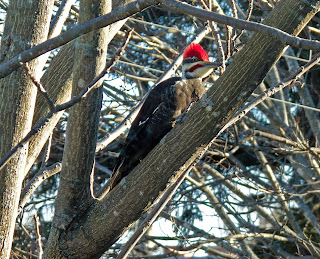NATURE MONCTON NATURE INFORMATION LINE
Dec 26, 2021 (Saturday)
To respond
by e-mail, please address your message to the information line editor, nelsonpoirier435@gmail.com .
Please
advise the editor at nelsonpoirier435@gmail.com
if any errors are noted in wording or photo labelling.
For in some soon will be available information on Nature Moncton, check the
website at www.naturemoncton.com .
Edited by:
Nelson Poirier nelsonpoirier435@gmail.com
**Ed and Jane LeBlanc went for a
walk on the St. Martins beach Christmas morning, to walk off breakfast and make
room for supper. They dressed for the brisk wind and low temperatures. Jane
nearly stepped on a SNOW BUNTING before she saw it. It flew a short distance
away and posed for great photos. Then a piece of plastic garbage flew by,
startling both bird and photographer, bird flew and was not relocated.
**We have had a Pileated Woodpecker coming to our urban yard seemingly
every day for the past 10 days. It seems like an unexpected habitat for the
species and only a male is being seen coming. It fed on peanut butter once at
the feeders and cleaning the winter grapes on the vine as well as insect gleaning a duo of Red
Maple that were dying in our front yard. One of those trees has been removed
but the City left an 8 foot stump which have seen other woodpeckers at, but not
the big guy yet. It would appear to have the area as a territory but may be
popping over from Centennial Park which is not that far away.
**Richard Perron shares a photo of a caterpillar he photographed on the
Morrison Cove trail in Miramichi he photographed in September of 2019.
Caterpillar season has passed but this is an interesting one to know for the
future as it is common and problematic to humans if handled. It is the
caterpillar (larval) stage of the American Dagger Moth. It is often
confused with the tussock moth group.
The
common adult American Dagger Moth is medium to large sized with dull grey
markings. The sizable caterpillar at approximately 2 inches in length is
completely covered in bright hairs (setae) that may be pale yellow or white. It
is the long bunches of black bristles, like long eyelashes, that extend from
the body in 4 bunches and extra long black bristle at the rear of the
caterpillar that are problematic. These bristles can break off and embed
themselves into skin when the caterpillars are handled and the toxins stored
inside the hairs have a stinging sensation if touched and can leave a burning,
itching sensation on the skin which can develop into a rash, which usually
subsides on its own.
All this to leave the suggestion that this caterpillar not be picked up
by curious naturalists!
Nelsonpoi willrier435@gmail.com
Nelson Poirier
Nature Moncton


